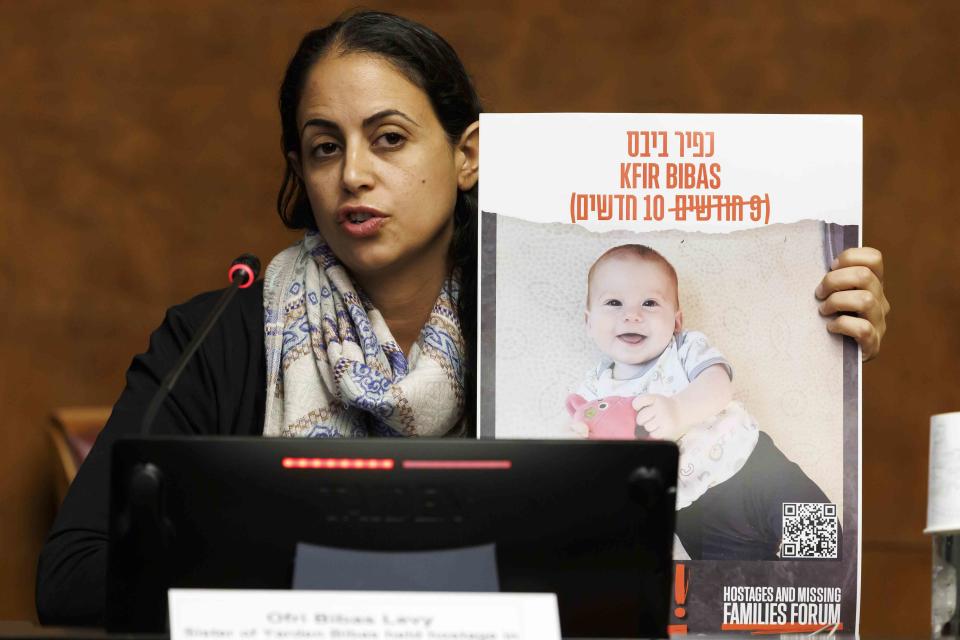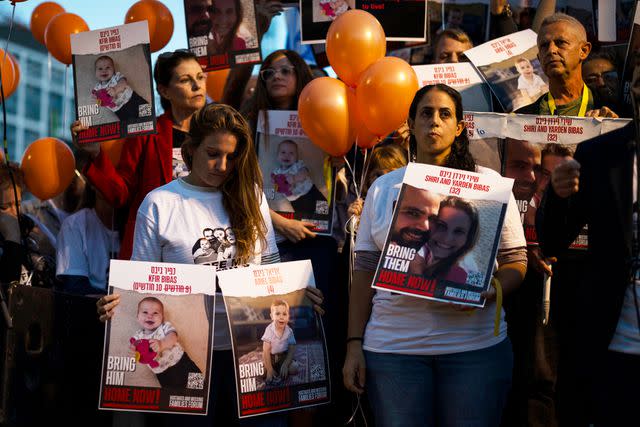No Clear Information About 10-Month-Old Israeli Hostage Kfir or Family, Says Rep: 'It's Just Horrendous'
Hamas has claimed the baby, his 4-year-old brother Ariel, and their mother, Shiri Bibas, were killed in an Israeli airstrike without sharing evidence

Salvatore Di Nolfi/Keystone via AP
The fate of a 10-month-old baby abducted by Hamas with his mother and brother during the Oct. 7 attack on Israel remains unknown.
Hamas claimed Wednesday that baby Kfir, Ariel, 4, and their mother, Shiri Bibas, were killed in an Israeli airstrike, but did not provide any evidence, multiple outlets reported this week.
A disturbing video, a report from CNN detailed this week, has since been released by Hamas showing a distraught Yarden Bibas, the children’s father, currently held hostage in Gaza. In the footage, he reacts to being told that his wife and children are dead.
The Israel Defense Forces (IDF) said in a statement shared with NBC News this week that they are investigating the claims of the three deaths. An IDF spokesperson also described the video as an "act of psychological terror," this week, per CNN.
On Friday, Bibas family representative Ophyr Hanan called the latest news and video “horrendous” in an interview with PEOPLE.
"It's horrendous. It's just horrendous," Hanan says.
“On the one hand, these videos are a sign of life,” she adds. “On the other hand, we know that they're being used as psychological terror against the families. So what are we supposed to feel? Are we supposed to be happy that he's alive or completely destroyed by the fact that he thinks his family is dead?”

Sipa via AP Images
Shiri Bibas and Yarden Bibas, kidnapped by Hamas on October 7, 2023. Around 150 members of the French Union of Jewish Students (UEJF) put up posters featuring some Israelis kidnapped by Hamas to draw attention to their lot in Paris, France on October 15, 2023Hanan says the extended Bibas family has no reliable information as to whether the redheaded mother and her young children are alive or not. Kfri is the youngest of an estimated 240 hostages originally taken by Hamas. Approximately 136 remain in Gaza, the AP reported on Friday.
“We will believe it when we see them dead or alive,” she says, citing examples like Emily Hand, 9, and Hannah Katzir, 77, both of whom were believed to be dead before emerging from captivity alive.
On Friday, the ceasefire between Israel and Hamas ended, devastating the families of the remaining hostages, which includes Yarden.
“We do not want any of this,” Hanan says. “We do not want the war to continue. We do not want the ground infiltration to continue. We want the ceasefire to proceed for as long as possible so that the hostages can be released in whatever way possible and through whatever means necessary.”

Ilia Yefimovich/picture alliance via Getty
Protesters and relatives of the Israelis Bibas Family hold balloons and poster during a gathering calling for the family immediate release from Hamas militants on 28 November 2023 in Israel, Tel AvivHanan attended a Los Angeles event for families of hostages on Friday that included Itay Raviv, whose great uncle Abraham Munder, 78, remains in captivity in Gaza. Several of his family members, including nine-year-old Ohad Munder, were released earlier this week, according to multiple outlets.
“Three of my family members were released last Friday,” Raviv says. “This is what gives us hope and we know that it is possible.”
His great uncle, he explains, had attempted to hold the safe room door shut in his house as terrorists arrived. “Abraham “is not in very good health, he has a balance issue. He walks with a cane. He barely sees,” Raviv says, stressing that the male hostages should not be forgotten. “They suffer too. They hurt too. And we need to (release them) quickly. They don't have time.”

Andrea Mandell
(Left) Itay Raviv holds a photo of his great uncle Abraham Munder, 78; Ofir Weinberg holds a photo of her 38-year-old cousin Itai Svirsky (right)Like the other gathered family members, cousins of hostage Itai Svirsky, 38, held his photos as they spoke, sharing harrowing details of how Svirsky was forced into captivity after witnessing the murder of his mother.
“In the last week we had some new information about Itai, because the hostages that were kept with him got released,” Naama Weinberg says. “Itai is alive. We could still save him. He was not injured during the attack.”
But after witnessing his mother’s death, “he's in a very bad mental state," she explains. "He thinks he has no family to return to, He doesn't know his brothers and sister survived. He doesn't know our grandmother survived. He assumes that his dad was murdered too. He's very anxious and he's now left alone in captivity with those kind of thoughts, not knowing if the next time they'll open the door, they'll execute him. And that is a thought going on on in his mind for 56 days now.”
The relatives called for a unified U.S. push to return the hostages, emphasizing that the release of civilians is not about choosing sides. “This is a human rights issue, a humanitarian issue,” Raviv says. “Anyone who advocates for human rights should support this cause.”
For more People news, make sure to sign up for our newsletter!
Read the original article on People.


